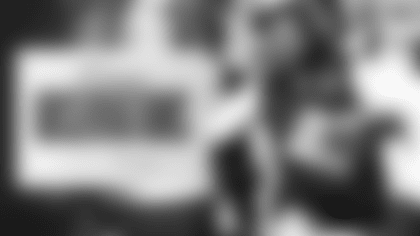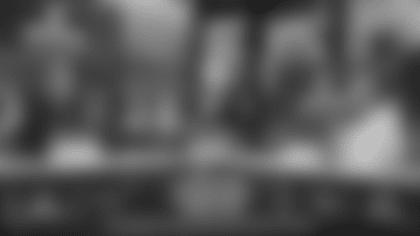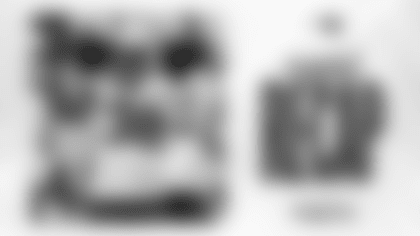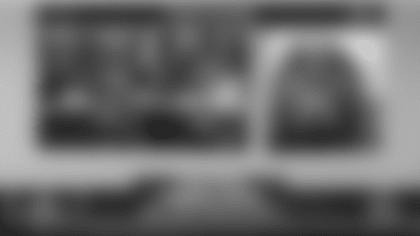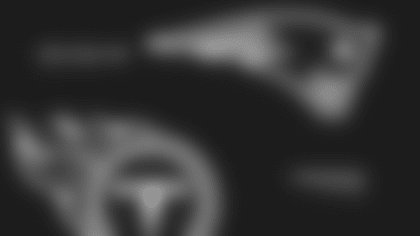Patriots defensive coordinator Dean Pees addresses the media during his conference call on Tuesday, November 17, 2009.
Q: Jonathan Wilhite was on Reggie Wayne quite a bit. It seemed like he was right there on a lot of those plays. How do you look at a guy like that who - Wayne obviously is a high level receiver - and what kind of job do you think Wilhite did on him?
DP: Well, I think he...we did match up Wilhite quite a bit on him, or he ended up on him quite a bit because he was over there on that side. And there were times he played some very good coverage on him. On the very first one down the sideline it was a great catch by Wayne. The ball was put in the only spot it could be put in and Jonathan had good coverage on him. The bottom line still is that we can't let him catch the ball. So he did some good things and some not so good things, just like everybody kind of in coverage throughout the day. We had some very nice plays, some good tight coverage, some good jams on the receivers. Then we had some times where we just weren't consistent and didn't do it all the time and we just need to do better. So he had some good plays; he had some not so good plays.
Q: I know Miami's rookie might have run into this a little bit with Randy Moss, but are there plays where you look at it and say, 'God, that's just the quarterback and the receiver who have played together for nine years and are this good and they're just making a play and it's going to be really tough to defend that'?
DP: There're always those. It doesn't really even have to be a quarterback and a receiver who have been together nine years. A guy can make just a great throw and a guy can make just a great maybe one-handed catch. I've certainly seen Randy make some catches that I just don't know how you defend him. He just does it. That's part of being a defensive back and playing in the NFL. They're going to make some plays. You've got to make more than they make and not give up the big ones and play the next play. You've got to forget about it. You've got to have a short memory and be ready to play. I don't know of any defensive back in the NFL that probably hasn't been beat at some point in time. Just kind of make sure you beat them more than they beat you.
Q: I can't imagine a secondary being tested more than when they play against Peyton Manning and the Colts. What did you learn about your group on Sunday?
DP: Well, I think it's not only the secondary, but the whole defense. The whole thing about pass coverage, no matter if it's Peyton Manning or who it is, it's a team thing. The pass rush is involved, pressure on the quarterback, lack of pressure on the quarterback. Sometimes it's a coverage situation, the ability to adjust to different coverages. There're just so many things involved. I think that we did some good things. We just didn't do enough of them. We had them punt seven times, which I don't know the last time we've had them punt seven times and gotten two interceptions off of him, but at the same time, when it's all said and done, that wasn't enough. The bottom line is to win the game and not give up points. Yardage doesn't mean anything; It's points that mean something. The bottom line is we played pretty good for three quarters, we gave up some things here and there, but we didn't play good for four quarters. So that's what we kind of learned: we've got to learn to finish and just be more consistent throughout the whole thing. Like I said, we did some very good things that we can build on, but we've got to learn from our mistakes and try to correct those.
Q: How did not having Ty Warren and Jarvis Green limit what you were able to do defensively, if at all?
DP: Well, it's obvious, the biggest thing about having your entire core of people on defense is [it's]always better because of depth situations and giving guys breaks and rolling new guys in and doing that kind of stuff. Scheme-wise I don't know that it necessarily changed a whole lot, other than you just like to always have everybody healthy. Any time you have a good player, you'd like to have them playing, just like anybody would - an offense or a defense. We had guys that stepped up and tried to do the job and again, like I said, you'd always like to have all of them, but we didn't, so we went with what we had.
Q: I think there's a perception, and I'm not sure if it's accurate, but when you guys went up 34-21 in that game in the fourth quarter, I noticed that you put out six defensive backs, which might have been a little bit different than what you did for most of that game up to that point. Outside of that personnel change, were the defensive calls different? I think the perception is that maybe you went into more of a prevent defense and maybe that contributed to the Colts' ability to get a quick score.
DP: No. You've got the first part right; we went with six defensive backs because we figured that at that point in time, they were going to throw the ball, certainly, more than running it. They needed to get some points. But the calls did not change. We have the ability to play, whether it's 4 [defensive backs], 5 [defensive backs] or 6 [defensive backs] and play the same calls. We did not change the philosophy of the defense.
Q: You obviously have a lot of young players on defense this year and changes from last year. How would you assess overall where they're at, and overall even though they are rookies, are they almost like second year players because of all the playing time they've gotten?
DP: Yeah. Rookies are not rookies anymore. I mean, we've played nine games and four preseason games - that's 13. Thirteen games at this point in time. That's more than a college season, so these guys aren't rookies anymore. Like I said, I think we've done some good things. I've been pleased with some things. There've just been some times, too, that we just need to be more consistent. We have things going, it seems like...for example on Sunday night, we would play well for a series, play really well, and then next series, similar calls or whatever, and we maybe just didn't play them quite as well. We're a little bit inconsistent at this point in time, and that's across the board basically with the young guys, and no particular guy; it really goes across the board. We just, we need to do better. We need to finish and do a better job totally. Like I said, there's been some good things that I've seen that we can certainly build upon, but there're a lot of things, too, that we need to get better at. We need to keep working hard every week at it.
Q: I'm not sure if it happened in this game, but I think in the previous game Derrick Burgess had played some regular outside linebacker as opposed to just a pass-rushing defensive end. Do you think he will be doing that more, and was that more difficult to teach him that sort of expanded role?
DP: We've always said that all the guys kind of have an expanded role. We've had safeties that have played corner, corners that played safeties, or inside [linebackers] play outside, defensive ends play outside [linebacker]. Everybody on this team...I don't know of really anybody that has one role and that's all they ever do. Our nose tackles play ends. In 34, 4-3 - everybody has an expanded role to some sort. How much we use that each week really is based on the team that we're facing. Is this going to be a good scheme? Will this guy fit in that position against what they like to do? There're just a lot of criteria involved in whether or not he ends up playing that role again. I can't really tell you; it just all really depends on what our game plan is that week and if we feel like he is the best person to put in that situation.
Q: The fourth down call has obviously generated a lot of passionate talk among media and fans, and Bill Belichick is taking a fair share of criticism in that regard. I'm curious what you've seen from him over the year in terms of times like this that has maybe caught your eye in terms of how he handles situations like this.
DP: As far as I can see right now, it's business as usual. I haven't seen Bill in any different light. [We] came in here yesterday and did our job that we normally do on Monday, and I'm in here on Tuesday talking to him about game planning things. Bill is Bill. There hasn't been any change and that's really all I can tell you.
Q: Because of the depth fact you mentioned without Ty Warren and Jarvis Green and the way Manning plays hurry up, were your players more tired in the fourth quarter than you're used to seeing them?
DP: I don't know. I think that would be something you'd have to actually ask the player. I think obviously, anytime in any fourth quarter in a game that's a no-huddle type game, guys are going to be a little more fatigued. Whether or not we were more fatigued, I really couldn't say. But I don't really think that was a factor. I just think that we needed to make some plays at critical times and we didn't do it. You can look at - it always comes down to in the end. People look at either the last drive or the last play, but there are always plays in the game that could have changed the outcome. We had two interference calls that were costly penalties and both of them led to scores. If they don't lead to scores, maybe we get off the field. I can't say we would or we wouldn't, but those certainly didn't help. So there're always plays throughout the entire game and to assess it coming down to the end or us being fatigued, I don't really think that is correct.


